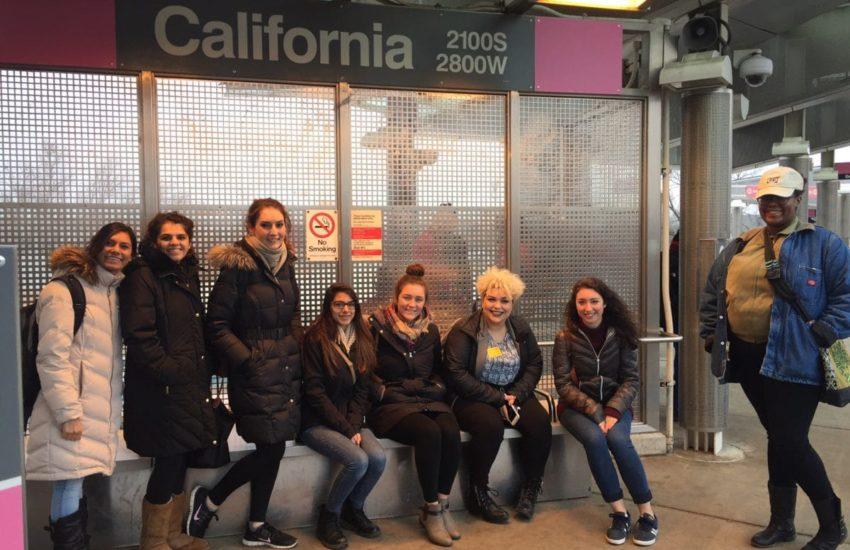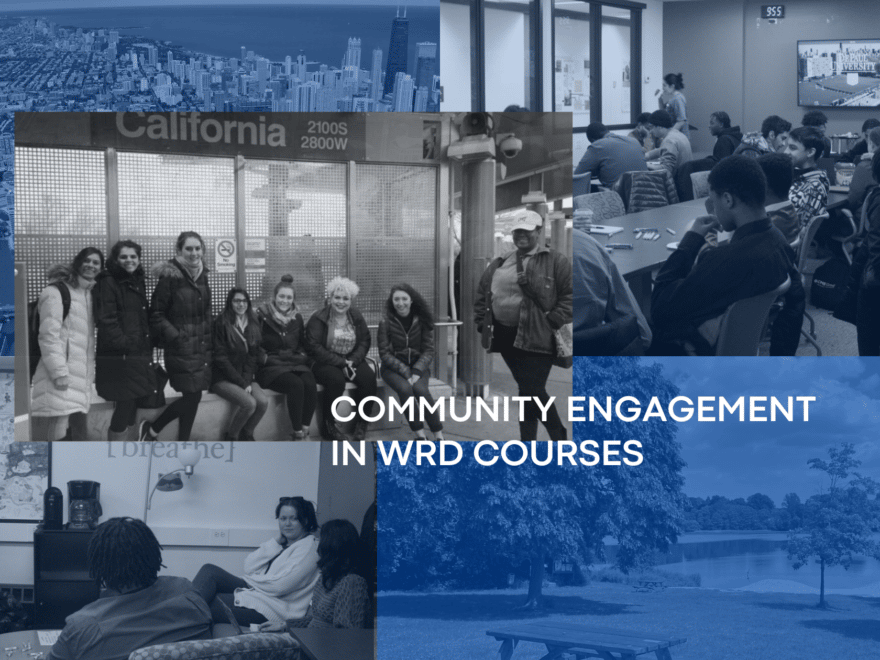One of the WRD Department’s goals for students is to prepare them, at both the undergraduate and graduate level, to excel in the range of contexts in which they will go on to write. Practicing writing in a variety of contexts and genres, for a variety of audiences, is a key part of this preparation that is embedded into many WRD courses. Community-engaged WRD courses offer students the opportunity to deepen their learning by engaging with real-world audiences, learning more about their local communities, and producing meaningful writing with tangible impacts.
Read on for perspectives from faculty in various roles across the WRD Department on how they how they embed community engagement into their courses, and why it matters.

First up is Jen Finstrom, a DePaul graduate, the Outreach Coordinator at DePaul’s Writing Center, and adjunct faculty member in WRD. Finstrom teaches several community-engaged undergraduate courses, including WRD 371 Mentoring Youth in Community Writing Groups and WRD 377: Writing & Social Engagement. Both of these courses partner with local schools in collaborative writing projects to enhance the learning of both DePaul students and the students they work with.
Speaking about WRD 371, Finstrom shared that the course “is really a combination of things that I hold dear both personally and professionally. Before I started teaching in 2012, I worked in DePaul’s Writing Center as a peer writing tutor, and the collaborative atmosphere is something that I really value in teaching, which really makes the courses where I have a partnership really special to me. The fact that the class also focuses on poetry makes it doubly special.”
Finstrom also discussed the importance of community-engaged courses in connecting the larger institution within its community, and how doing so can allow students and community members alike to learn and grow collaboratively. Speaking of growth, she mentioned also that “A community-engaged course also provides skills that will be useful after college, as well as opportunities for a lived experience that might lead to re-envisioning what they’re capable of and the sort of future career they’d like to have.”
Monica Reyes, who teaches rhetoric classes in WRD at both the undergraduate and graduate level, shares her perspective as well. Her current graduate courses, WRD 511-Rhetorics of Displacement, is partnering with a humanitarian organization in Chicago that works with immigrant populations. In this course and across her community-engaged work, Reyes employs a lens of social justice to ensure that partnerships are carried out with care.
Reyes touched on the ways that community engagement becomes especially relevant to WRD. As she shared, “community-engaged courses help students confront the purposes and problems with rhetorical theories; students are challenged to see how theoretical concepts apply to real-world situations and affect real people. In this way, students may be inspired to add to the discipline’s conversations in helpful ways. The whole field can benefit when students engage with the community.”
“The whole field can benefit when students engage with the community.”
Dr. Monica Reyes
Adding to the conversation, Lisa Dush–Director of the HumanitiesX Collaborative, Coordinator of the SWAN Certificate, and WRD professor–discusses the importance of community partnerships to her work in WRD and throughout these initatives. Among her community-engaged courses, Dush teaches WRD 526 Grant & Proposal Writing and WRD 532: Content Strategy, which both partner with nonprofit organizations to help produce meaningful content and outcomes.
Lisa shared her perspective on the overall importance of community engagement in WRD as well as its relevance to her own scholarship and work in the department.
Dush wrote, “Good writers can enter a new situation, assess that situation, and write in appropriate ways. Students are very familiar with the classroom situation–they’ve been writing for teachers all their lives. But when they write in a course partnered with a nonprofit organization, students can practice writing in ways appropriate to a nonprofit’s particular needs, capacities, and circumstances. Creating and scaffolding opportunities for that sort of learning is one of the primary ways I approach course design.
“Many of the courses I teach, like Grant Writing and Content Strategy, focus on writing and communication practices that can only be very partially understood outside of their application in actual workplaces. When students work with a nonprofit organization, they can apply the theory and adapt the ideal practice–they can, in short, better understand the course topics. There is a service aspect to this approach, too. Many of the nonprofit organizations that my courses work with do not have the staff capacity or budget to get started with grant writing or content strategy or digital storytelling. Having a class of talented WRD students (and students from other programs, too) focus on this work for 10 weeks can create materials and ideas that are a real benefit to these organizations.
“As SWAN Coordinator, regularly partnering with Chicago-area nonprofit organizations also helps me to keep learning about the sector, to make connections within it, and to understand the sort of jobs and internships available to students who want to work in nonprofits.”
“I think community engagement is best viewed as a two-way process.”
Dr. Tim Elliott
Finally, WRD professor Tim Elliot, who is teaching WRD 377: Writing and Social Engagement: Community Centered Environmental Advocacy in Spring Quarter 2023, shared his perspective.
Elliott reflected, “I think community engagement is best viewed as a two-way process. It provides community partners with editing, written materials, and feedback that they may have struggled to get easy access to. It also provides students with a chance to write, edit, and correspond with a real-life client. These sort of community-classroom exchanges push beyond mutual benefit to something like mutual learning; community partners learn a bit about DePaul’s mission and writing students. Partners may even learn more about how different types of writing can benefit their organizations long term. Students learn a bit about the nonprofit world and the specific community partner’s goals, struggles, and plans. Students also learn about the impact they can make as writers, editors, and collaborators. “
In the opportunities it provides for professionalization, deep learning, and collaboration, community engagement will continue to be a key element of WRD’s work. To stay up to date with community-engaged courses being offered in the department each quarter, visit our Courses page.
